Your Quest is at an End but Your Torment Continues Forever
| " | We have faced far worse than this one fallen mortal. But we are the gods! We who the mortals worship. We who rule over this land. We who will not be swept aside by this petulant fool! Brothers, put aside the petty grievances that have splintered us for so long. We will unite. We will stand together. And I will wipe out this plague! Olympus...will prevail! | " |
| –Zeus to his fellow gods, Poseidon, Hades, Helios and Hermes. | ||
Zeus (Greek: Ζεύς/Δίας) is the main antagonist of the Greek era of the God of War series. He was the youngest child of the Titan King, Cronos, who ascended to become the King of Olympus and the God of the Sky, Thunder, Lightning, and the Heavens.
He acted as an minor ally in God of War before serving as the main antagonist of both God of War II and God of War III, and was the biological father of most of the gods of Olympus and many famous demigods such as Hercules, Perseus, Peirithous and even the Spartan warrior Kratos as well as his brother Deimos.
Greek Mythology
In Greek Mythology, Zeus was the King of the Gods, ruler of Olympus, and God of the Sky, Heavens, and Lightning. Zeus was youngest of his six siblings. His symbols were the Lightning bolt, the Eagle, the Oak Tree and the Bull. Zeus was the youngest son of Cronos and Rhea. He was very well known for his erotic escapades with beautiful mortal women, resulting in many godly and heroic offspring, including Athena, Apollo, Artemis, Hermes, Persephone, Dionysus, Perseus, Hercules, Helen and Minos. When the loss of his older siblings by their father Cronos became too great for Rhea to bare any longer, she hid him from Cronos far away, giving him a stone to swallow instead. Once grown, the young God sought to free his siblings and overthrow his father. Disguised as a cup-bearer, Zeus mixed a brew into Cronos' wine, causing him to vomit up the stone that had taken his place, and then his siblings. Overthrowing the Titans, Zeus castrated Cronos and banished him to Tartarus. Later drawing lots with his brothers Poseidon and Hades to determine who would rule the skies, oceans, and the Underworld, Zeus won the sky, and became the King of Olympus.
Some sources claim that Zeus is technically the eldest, due to being the only child to not be kept from the world and trapped in their father's stomach, though this is disputable, and some claim fabricated by Zeus himself to lend validity to his claim to the sky before he and his brothers decided to draw lots.
His counterpart in Roman Mythology is Jupiter and was known as Ba'al Hadad to the Canaanites/Israelites, in Norse Mythology, his counterpart is Thor.
In the God of War Series
Birth
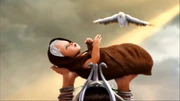
An infant Zeus is taken away by an eagle at his mother's command.
During the reign of the Titans, Cronos was informed of a prophecy foretelling his eventual downfall at the hands of one of his own sons. To prevent this fate, Cronos swallowed all of his children, one by one.
When Zeus was born, his mother Rhea was distraught at the loss of her first five children and devised a trick to save him by letting an eagle carry the baby Zeus to safety, while he was replaced by a stone wrapped in cloth which Cronos devoured, having mistaken it for Zeus. The eagle then carried the infant Zeus to Gaia so that he would be raised and blessed with the strength to stand up to Cronos. During this time, Zeus developed a deep hatred for his father, and looked forward to the day he would finally release his siblings; one of Zeus' drawings inside Gaia portray him opening Cronos's belly and setting them free.
The Great War
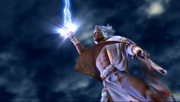
Zeus during The Great War
As he came of age, Zeus decided to put his plans into action. Zeus freed his siblings and declared war on all of the Titans, thus betraying Gaia. The new rulers of Greece, the Gods, calling themselves Olympians, fought against their predecessors with great ferocity and power. The battle between the Gods and the Titans formed the landscape of Greece, shaking the earth with massive earthquakes and crumbling mountains. To end the war, Zeus created the all-powerful Blade of Olympus, which was used to banish the Titans to the foulest pits of Tartarus. However, the Evils borne from the war posed another threat to Olympus, so Zeus commissioned Hephaestus, the Smith God, to build Pandora's Box in order to house the Evils. Unbeknownst to him, Athena called forth a power that transcended any God, Hope, and placed it inside the box to counteract the Evils should the box ever be opened. When Zeus asked Hephaestus where to hide the box, the Smith God suggested that it should be placed on the back of Cronos. Using the architect Pathos Verdes III, he constructed an enormous temple to house the box and then chained it to the Titan's back, sentencing him to wander the Desert of Lost Souls for all eternity. Little did the great Zeus know that the events that had just transpired would eventually doom him.
After the Great War
| " | Is this the best you can do, Father!? You send a broken mortal to defeat ME!? The God of War!? | " |
| –Ares | ||
At some point, Zeus had an affair with a mortal woman named Callisto. The circumstances are unknown, but the affair resulted in two sons. The oldest one was Kratos, a mighty warrior with unstoppable rage and ambition. Hera, displeased with Zeus for fathering yet another illegitimate child and (correctly) predicting that his existence would eventually doom Olympus, demanded that he kill the boy immediately after his birth. Zeus, at this point still a somewhat benevolent and caring figure, took pity on the child and refused. Around the same time, however, the Oracle foretold that one of Zeus' sons, a "marked warrior", would rise up against the King of the Gods and kill him. Noticing the strange birthmarks on the youngest son of Zeus and Callisto, Deimos, he sent Ares and Athena to Sparta in order to capture the boy and bring him to Thanatos.
Later on in Kratos' life, having brutally slain his own family in blind anger due to a scheme by Ares, the newly christened "Ghost of Sparta" pledged to serve the Gods of Olympus, including his father Zeus, in the hopes that they would relieve him of his nightmares. This can be compared to the fate of his half-brother Hercules, who had also killed his family in a madness caused by Hera.
About halfway through Kratos' penance, Zeus was one of the many Gods that fell victim to an enchanted slumber, orchestrated by Morpheus when the Sun God, Helios, was kidnapped by the Titan Atlas. Kratos eventually discovered that this was the work of Persephone, who intended to use the Sun God to empower Atlas in order to destroy the Pillar of the World and bring an end to all life, as well as her own suffering. Fortunately for Zeus and the other gods, Kratos was able to defeat the Queen of the Underworld and save Helios, returning him to the sky and forcing Morpheus to retreat. What they did not know was that Kratos had been forced to relinquish any hopes of reuniting with his beloved daughter in the process of saving the world, pushing his disillusionment with the Gods ever closer to open hatred and rebellion.
Near the end of Kratos' service, Ares besieged the city of Athens in the hopes of gaining Zeus' favor over his sister, Athena. Zeus, having forbidden the Gods from waging war on each other and fearing the possibility that Ares might be the "Marked Warrior" who would overthrow Zeus, allowed Athena to receive help from Kratos. Athena told him that killing Ares would complete his penance and rid him of his past sins. During his quest, Kratos met Zeus himself within the damaged city of Athens, where he was given Zeus' Fury, the ability to wield and throw powerful lighting bolts. In addition, Zeus took on the mortal guise of a Grave Digger and created a portal to the Underworld via a grave he claimed to be digging for Kratos, allowing the Spartan to escape the realm of the dead (after Ares impaled the Spartan with a pillar) late in his adventure.
Retrieving Pandora's Box from Kratos' dead corpse, Ares yelled to the skies, cursing his father for constantly favoring Athena and asking Zeus if he could finally see what his son was capable of. Ares declared that he would not hesitate to use the Box against Olympus itself, only for Kratos to return from the Underworld and use a bolt of Zeus' Fury to reclaim it. Kratos opened the ancient artifact and harnessed its power to kill Ares, his former master. Zeus and the Gods guided Kratos to kill Ares, as they had incorrectly believed that he was the only real threat to Olympus. The Olympians rewarded Kratos by forgiving him for the crime of killing his own family (although, to Kratos' dismay, they were unable to remove the horrible memories from his mind), and made him the new God of War.
Zeus' Betrayal
- See also: God of War: Betrayal and God of War II
It was believed that Deimos is the Marked Warrior so it is very possible that Deimos' death and Kratos' destructive and aggressive behaviour led Zeus into believing that Kratos is the Marked Warrior who would seek revenge against the Gods of Olympus and one day destroy them. Another moment which led Zeus betray Kratos is when Kratos told Athena that the Gods would pay for that... Even though Kratos did not know that the grave digger was actually Zeus, he was there when Kratos exclaimed these words. Later on in Rhodes, Zeus tricked Kratos, told him to cast his powers into the Blade of Olympus and with that act, Zeus found a way to take it and kill Kratos as long as his powers would not be inside Kratos himself.
- Zeus: "You must vow to forever serve me!"
- Kratos: "I serve no one!"
- Zeus: "Then you leave me no choice!"
It is later revealed that Zeus and the other Gods had fallen prey to the Evils locked away in Pandora's Box after Kratos opened it to kill Ares. Apparently, Zeus didn't realize that if Kratos used the Box, the Evils would be released onto them; he had instead hoped that the Evils would fuel Kratos. As a result, Zeus was overwhelmed by his personal plague: Fear. Overcome with extreme paranoia and frightened by Kratos' increasingly destructive behavior, Zeus soon realized that Kratos would be the one to perpetuate the cycle of son killing father. Just as Cronos killed Ouranus, and as Zeus himself defeated Cronos, the King of the Gods expected that Kratos, infuriated by the revelation that not even the Gods could end his nightmares, would kill Zeus.
Some point after Ares' death, Zeus confronted his son Hephaestus and brutally interrogated him, after suspecting that the Smith God lied to him by stating that storing Pandora's Box at Pandora's Temple on the back of Cronos was the best option, when really, the Flame of Olympus was the most crucial place to store the box with Hephaestus' forged daughter, Pandora, being the key to the flames. As punishment for his deceit, Hephaestus was banished to Tartarus by Zeus as well has having his daughter, Pandora, taken away by the latter. With Pandora's Box retrieved by Kratos from it's temple, Zeus would also have his father Cronos spend the remainder of his eternity tortured in the foulest regions of Tartarus.
Zeus' fears were further exacerbated by Kratos' open defiance of the other Gods, ignoring their demands that he cease his relentless conquest and destruction of Greece. During Kratos' attack on Rhodes, Zeus devised a scheme that would put an end to Kratos' reign. He disguised himself as an eagle and drained a portion of the new God of War's power, transferring it to the Colossus of Rhodes. This caused the statue to come alive and attack the now mortal-sized Kratos, who initially believed that Athena was the one who betrayed him. Zeus further took advantage of the situation by tricking Kratos into infusing the rest of his god powers into the Blade of Olympus, the weapon that brought an end to the Great War of the Gods and Titans. Upon doing so, Kratos destroyed the Colossus with ease, but was crushed under the crumbling statue's hand soon afterwards, weakening the Spartan to the brink of death. Thus, in order to survive, he needed to retrieve the Blade, which had been knocked out of his grasp by the falling Colossus.
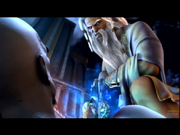
Zeus betrays Kratos
As Kratos was about to reach the Blade, Zeus finally revealed himself, admitting responsibility to Kratos for everything that had just transpired. Zeus claimed that his motivation was to "undo Athena's mistake" (presumably the act of making Kratos a God) and prevent Ares' fate from becoming his own. The King of the Gods then ordered the Spartan to submit, but an outraged Kratos refused, causing Zeus to stab him with the Blade of Olympus. As Kratos slowly died, Zeus expressed his disappointment in Kratos, insisting that the Spartan warrior had made the wrong choice. However, Kratos continued to insult the King of Olympus, and Zeus responded by stabbing him with the Blade again, telling his son that the cycle has come to an end, and everything that he ever knew would now suffer because of his sacrilege. Zeus then destroyed all of the soldiers present, while a dying Kratos promised that he would have his revenge as Zeus leaves and casts Kratos into the Underworld.
Upon leaving Rhodes, Zeus proceeded to destroy Sparta not only because the Spartan people worshipped Kratos, but to further punish Kratos himself. After destroying Sparta, Zeus believed he finally dealt with Kratos and returned to his throne on Mount Olympus.
Kratos' Revenge
| " | Come down here and face me now, Zeus!! | " |
| –Kratos | ||
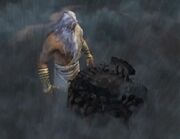
Zeus morphing into a gigantic form to combat Kratos.
Unfortunately for Zeus, Kratos was far from finished. Aided by Gaia and the Titans, he returned to life, journeyed to the Island of Creation, and killed the Sisters of Fate. With the Power of Time itself at his command, Kratos returned to the moment when Zeus tried to stab him with the Blade of Olympus, emerging from a portal and knocking the off-guard God King to the ground. Surprised at this development, Zeus presumed that the Sisters of Fate had unexpectedly aided him. Kratos, pulling the Blade of Olympus from his past self, told Zeus that the Sisters were dead. The King of Olympus declared that he had underestimated Kratos but will not make the same mistake again and the two combatants charged towards one another, taking to the skies as they fought. They ended up on the Summit of Sacrifice, where an epic battle began. Kratos fought Zeus furiously and managed to deliver several powerful blows, as he stated he would kill Zeus for his actions. Enraged at his defiance, Zeus unleashed his full might on the vengeful warrior in the form of a deadly electrical storm.
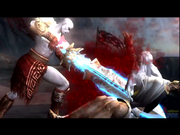
Kratos stabs Zeus with the Blade of Olympus.
Unable to overpower the furious god, Kratos resorted to military tactics, a feigned surrender that Kratos knew would immediately stop the onslaught. Kneeling in front of the Blade of Olympus he asked Zeus to end his life and release him from his torment. Granting what he thought was Kratos' final request, Zeus agreed to release him from his life, but insisted that his torment was just beginning. The Great God was tricked, however, and the Spartan, using the Golden Fleece to deflect a small remainder of Zeus' lighting, overpowered and took the Blade from Zeus, pinning both of his arms to a rock and began to impale Zeus with the Blade of Olympus, intending to kill him the same way he did to him until Athena intervened.
Zeus took this opportunity to free himself, warning the Spartan that he had started a war he had no hope of winning. Zeus then attempted to flee, but Kratos immediately pushed Athena aside taking the Blade to make one more attempt on the severely weakened Zeus. However, Athena jumped in the way at the last second, sacrificing herself to save her father who took the moment to flee. Kratos was far more affected by Athena's death than Zeus, who coldly ignored her and narrowly escaped back to Mount Olympus though he did express concern for her later.
Just before she died, Athena told Kratos that he was compelled to kill Zeus just as Zeus did to Cronos, for Kratos was Zeus' son. This was the cycle Zeus had mentioned when he killed Kratos before. Declaring that no son should ever destroy his own father (ignoring the fact that Zeus had already done the same to his own father), Athena told Kratos that Zeus must live so that Olympus would prevail. God after God would deny Kratos his vengeance, for they would protect Zeus for the sake of Olympus. Watching the fallen Athena disintegrate, Kratos felt betrayed yet again and, using the Loom Chamber, he returned to the first Great War urging the Titans to accompany him back to his own time, where a wounded Zeus had fled back to Mount Olympus.
The Second Great War
- See also: God of War III
| " | My Brothers, We were forged in victory. A victory that ended the Great War and brought forth the reign of Mt. Olympus. Born from the depths of the Underworld, rooted to the River of Souls, our mountain emerged out of the Chaos. As it grew, so too did the might of the Olympians. We created a world of peace, a world of prosperity, a world that lives in the shadow and safety of my mountain. A mountain that has come to be the absolute measure of strength and power. Now, on this day, that power is to be tested. The mortal, Kratos, seeks to destroy all that I have wrought. Brothers, put aside the petty grievances that have splintered us for so long. We will unite, we will stand together, and I will wipe out the plague! Olympus will prevail! | " |
| –Zeus | ||
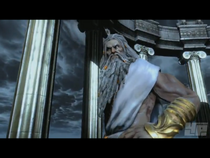
Zeus during the Second Great War
After the events of God of War II, Zeus returned to Olympus and told Poseidon, Hades, Hermes, and Helios about Kratos' intentions, telling them that they have to unite once more to preserve Olympus. When they saw the Titans ascending the mountain, the Gods immediately took action, while Zeus remained out of the front lines, likely still weak after his encounter with Kratos.
After witnessing the death of his brother, Poseidon, the King of the Gods decided to join the battle, with his Aegis being armed. As Kratos and Gaia reached the platform where Zeus was waiting for them, the Spartan approached the King of the Gods, telling his father that he could no longer hide behind Athena for safety. Zeus then chided his son by insisting that it was his blind rage that caused Athena's death, asking the Spartan how far he was willing to go to have his revenge. The Ghost of Sparta replied by listing his previous battles before stating that nothing would stand in his way and that he would stop have his revenge.
Infuriated with Kratos' defiance, The King of the Gods then decided to strike both Kratos and Gaia with his thunderbolts, thinking that they would both fall into the River Styx. Although Kratos did fall into the River Styx, he nevertheless survived and fought his way back to the top of Mount Olympus, destroying even more Gods and his son Hercules along the way.
Zeus later indirectly encountered his son through one of Pandora's Statues, warning him to stay away from Pandora. He would not encounter Kratos in person again until he raised the Labyrinth, thereby destroying much of the inner sanctum of Mount Olympus. He attempted to stop Pandora from entering The Flame of Olympus while disparaging Kratos both for his obsession with Pandora and all of the destruction he has caused.
They soon engaged in another fight, destroying more of Olympus' inner chambers. Their battle was interrupted when Pandora made another attempt to jump into the Flame. Kratos managed to grab her, but Pandora insisted to Kratos that he needed to let her go. Zeus, however, warned that he must not let her into the Flame, telling the Spartan that for once in his "pathetic life" he cannot fail like he failed in protecting his family. This inadvertently caused Kratos to let go of Pandora and attack Zeus in blind fury. With the Flame gone, Kratos saw and opened Pandora's Box, only to discover that it was empty. Zeus mocked his own son, stating that in spite of all his efforts, they ended in yet another "stunning failure", laughing his words further drove Kratos to the brink of madness. Zeus then retreated outside to the same dias that Kratos and Gaia confronted him on earlier, with Kratos following closely behind.
| " | Zeus: Such chaos... I will have much to do after I kill you. Kratos: Face me, father. It is time to end this. Zeus: Yes, my son. It is time. | " |
| –Zeus and Kratos final conflict | ||
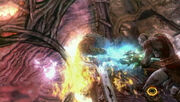
Kratos stabs Zeus (and Gaia) with the Blade of Olympus.
The King of the Gods observes all of the destruction his son has caused to Greece, telling him that he would have much to do once their battle is over. They fight each other again until they are interrupted by Gaia, who was thought to have been killed by Kratos. She returned to kill both her grandson for vengeance and her great-grandson for destroying her world, ignoring the fact that it was the death of the Olympians that caused it and that it would have happened anyway if the Titans had won. Zeus told Gaia that her pawn has failed her, and commented that she should have chosen the other one (probably referring to Deimos). Gaia then decided to crush the platform, declaring that father and son would die together. Both of them managed to enter the large chest wound she incurred earlier from her fight with Poseidon, making their way to her heart. There the fight raged on with both using Gaia's Heart to heal themselves in the battle.
Eventually, Gaia was killed when Kratos impaled Zeus against her heart with the Blade of Olympus, which apparently also killed Zeus. Gaia's body slowly broke apart and destroyed most of Mount Olympus.
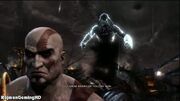
Zeus' astral projection attacks Kratos.
Regaining consciousness, Kratos retrieved the Blade of Olympus from Zeus' "corpse", but when he tries to leave, he is attacked by Zeus' still active spirit, which taking away all of his magic and equipment except for the Blade of Olympus, the Blades of Exile, and the Boots of Hermes, infecting him with Fear. Kratos was thought to be finished, but with the help of Pandora's spirit, Kratos managed to forgive his sins and unleash Hope from within himself. He then briefly battled Zeus' astral form, eventually forcing it to retreat back to his body, reviving Zeus. Kratos considered of attacking him with his blades but paused and realized that Zeus was so weak he could kill him with his bare hands. He then threw his blades aside and charged at Zeus.
Death
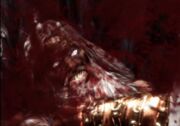
Zeus dies at the hands of Kratos.
Terrified, Zeus backed away, and tried to stop Kratos with his arms, but was unable to resist the Spartan's fury and was thrown against a rock. A black smoke (presumably Fear) escaped from Zeus' mouth, possibly meaning that the Fear had finally left Zeus. Kratos then begins to beat Zeus uncontrollably, kicking him in the face and throwing him against rocks, ultimately grabbing Zeus' beard and beating him to a bloody pulp. Interestingly enough, Zeus does not put up any resistance when the black smoke left his body. It is possible that he realized that by causing Kratos so much pain, he was responsible for his own demise.
Zeus' body disintegrated and exploded in a huge blast of light, unleashing absolute chaos upon Greece, and with this, the King of Olympus was no more, thus ending the reign of the Olympian gods.
God of War (2018)
Even many years following his death, Zeus still haunts Kratos. After Kratos defeats the Bridge Keeper of Helheim, he soon sees the image of Zeus in the sky calling to him. Kratos, surprised by the sudden arrival of his father, reveals to Mimir that he was Zeus' son.
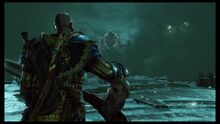
Zeus appearing in the sky in Helheim
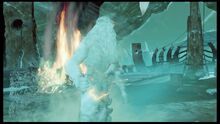
As he appears in Helheim
Kratos asks Mimir what that place was and how it's possible for the former King of Olympus to be there. Mimir tells Kratos to never venture there and that Helheim is known for torturing it's inhabitants with illusions of memories of their past. Later on in Hel, Kratos hears the past echos of Zeus speaking to him, which he ignores but would later see, along with Atreus, a ghostly reenactment of Zeus' final moments before his death, being beaten to death by Kratos.
Moments before killing Baldur, Kratos quotes his father of the cycle before breaking his neck, preventing Baldur from killing Freya in revenge.
Afterwards, Kratos tells his son of how he killed his own father as Atreus realizes the specter was his grandfather. This makes Atreus wonder if the cycle of children killing their parents is the fate of gods, although Kratos assures his son that his past doesn't define their future, and that they will be the gods they choose to be.
Multiplayer
| " | Align yourself with me and the light of Olympus shall be yours to wield. | " |
| –Zeus | ||
Zeus is one of the four mentors of God of War: Ascension's Multiplayer. His statue is the third one in the Rotunda of Olympus, staying right at the center of his brother's statues and face-to-face to any warrior who arrives at it.
Overview
The king of Olympus' warriors have the average physical powers and resistance from the game, but are the best in elemental damage. Their magic attacks, which come from the mighty lightning of Olympus, are incredibly strong, usually hitting opponents many times in deadly shocks and can disable some of their abilities for a short period when used.
A warrior of Zeus must count mainly on his magic bar against his enemies. Their electric attacks can overpower warriors and beasts in seconds.
Battle Mage
Impressive elemental powers.
Electric Magic
Stun opponents and disable enemy magics.
Zeus Items
Improve defense and escape.
Zeus Weapons
Can shock enemies in electric currents or strong explosions in some special attacks.
Zeus Armors
Focus on enhancing elemental powers and defenses.
Personality
Zeus' benevolent side was more prevalent in the original God of War, in which he was depicted as a caring god who sought to punish evildoers and oath-breakers, even empathizing with his son Kratos' (who at that time was unaware Zeus was his father) grievances against Ares despite all of the terrible things Kratos had done. Even though he had a benevolent side, he had some negativity within him as he placed a curse on his lover (and Kratos' mother) Callisto to transform into a grotesque monster should she ever reveal his relation to Kratos or Deimos, he also feared Deimos to the point of imprisoning and torturing him for eternity due to The Marked Warrior prophecy. He had even condemned his former ally, Prometheus, to eternal torment when the latter used the Fires of Olympus to help mortals, thus drew the ire of Zeus. After Kratos opened Pandora's box, he was possessed by one of the evils in the box: fear. This transformed Zeus into a cruel, wrathful, paranoid, and power-hungry deity, as evidenced by how he started treating the innocent Pandora with cruelty.
The evils of the box also caused Zeus to develop an intense fear of Kratos, whom he now realized was the "Marked Warrior" foretold in the Oracle's prophecy that would perpetuate the cycle of patricide which led to Zeus overthrowing his own father Cronos. Witnessing his ruthless murder of the Furies along with Ares, Thanatos, and Persephone, Zeus' fears were further exacerbated by Kratos' intense hatred for the other gods of Olympus (with Hephaestus, Athena, and Aphrodite being the only obvious exceptions) and his destructive rampages across Greece during his reign as God of War. In response, Zeus took the form of an eagle and siphoned off a large portion of Kratos' godhood powers, infusing them into the Colossus of Rhodes. He then tricked Kratos into transferring the rest of his powers into the Blade of Olympus, weakening him to the point of near-death before finishing him off for good. To prevent his followers from helping their fallen god and to punish Kratos even more, Zeus destroyed Sparta, killing hundreds of innocent people in the process. Not even his own family were safe, as he used them as mere pawns in his war against Kratos and the Titans, mourning little (if at all) about the losses of Athena (who tried to protect him, giving him a chance to escape Kratos' wrath the first time), Poseidon, Hades, Helios, Hermes, Hercules, possibly Hephaestus (even though he brutally beat him to a pulp on learning of his deception after being infected), and Hera, his wife. But when the evils that possessed him left his body, he somehow let himself get beaten by his son, implying that he finally realized that his persecution and fear of Kratos created a self-fulling prophecy.
He was also unfaithful to Hera, having cheated on his wife countless times and fathering many bastard children (including Kratos, Hercules and Deimos). He seemed to care very little about the well being of his own children, going as far as to dispose of his own sons Hephaestus and Kratos, caring very little to not at all for Ares' (whose destructive behaviour feared him) death and imprisoning Deimos out of fear of being dethroned.
Despite the fact that his father Cronos committed horrible deeds, Zeus was willing to betray and turn against all Titans, including Gaia, who once saved him from his father, seemingly for the sins of the latter. In addition to this, however, according to Atlas, Zeus' war against the Titans also stems from his hunger for power as he had a desire to rule over mortals.
Zeus' treatment of his fellow gods, mortals, and titans matches nearly perfectly with how Zeus treated others in actual Greek mythos. Just as Zeus in the games was cruel, controlling and arguably quite evil, this matched how Zeus was responsible for many terrible things that were written about in real-life Greek mythos. He had zero regard for nearly anyone, and would use everyone he could as a pawn to further his personal goals, including his own siblings and first-born children, even going as far as not showing any care when his entire family was being killed by Kratos, seemingly only focused on killing Kratos himself, without any remorse or sadness for the deaths of his closest family members. While this unnatural coldness from Zeus could be blamed on the evils that infected him from Pandora's Box, Zeus was already a horrible person like this well before that, so it is safe to say that Zeus has always been a cold, heartless being with little regard for anyone but himself.
Appearance
Zeus appears as an old muscular white-haired man. His eyes are pure white, best seen in the cutscene in God of War II in which he kills Kratos. In his neutral, unaltered form he appears to stand well over 7 feet when compared to the already especially tall Kratos. In God of War II and in the opening scene of God of War III he wears white toga and golden arm guards, but after the start of the Second Titanomachy he replaces his toga with a golden side guard, possibly the Aegis of Zeus, that had similar powers to the Golden Fleece.
Powers & Abilities
As the King of Olympus, Zeus is the most powerful of all the Olympians, more so than even his brothers Poseidon and Hades. His power is great enough to challenge Kratos to a greater degree than any other God. In his Astral Form, his power is greatly increased to the point he destroyed Kratos's equipment and easily overpowered Kratos; only yielding to the power of Hope that his son held within.
- Superhuman Strength: Zeus possessed incredible levels of superhuman strength. He could easily overpower almost anything in Creation and was strong enough to challenge Kratos for an extended period of time.
- Superhuman Speed: Zeus could run at extremely fast speeds. He could move as fast the lightning he commands. As demonstrated in the battles with Kratos, Zeus was able to evade attacks with the speed of lightning, appearing behind his opponent to strike.
- Superhuman Durability: Zeus was tremendously durable. He was able to withstand extreme punishment from Kratos in all their fights and could still stand up and flee in their first fight and survive long enough to access his Astral Form after a much more harsh beating from his son in their final fight. It should be noted that during his battle with Kratos at the Summit of Sacrifice, Zeus was stabbed repeatedly by the Blade of Olympus by Kratos, yet Zeus was able to survive, unlike other deities who fell to the Blade's power in a single strike, such Athena and Cronos.
- Superhuman Stamina: Zeus had tremendous amounts of superhuman stamina, able to fight Kratos for an extended period of time without ever slowing down.
- Flight: Zeus can hover and fly at amazing speeds.
- Weather Control: As God of the Sky, Zeus had control over parts of the weather that involved storms, allowing him to generate thunderclouds or create a tornado. He can combine clouds with his electricity to make his lightings much more powerful, to the point that a single spear of lightning was able to blast down Kratos and Gaia and destroy the latter's arm.
- Lightning Manipulation: As the God of Thunder, Zeus could control lighting to an unrivaled degree. He is able to generate extremely powerful and fast Thunderbolts that can shatter huge mountains and kill Titans. His Thunderbolts were strong enough to nearly kill Kratos, forcing him to trick Zeus to stop him. In his Astral Form, his Thunderbolts were strong enough to destroy almost all of Kratos's equipment. In addition, Zeus can manipulate lightning to empower his attacks, move faster, generate a lightning shield and cause an explosion of electrical energy.
- Immortality: As a god, he is immortal and can live forever. Like his brothers and other Olympian deities, Zeus does not age and is unaffected by time or succumbing to mortal frailty as sickness or impotence of any kind, he could not be killed by earthly weapons; only divine forces and weapons like the power of Hope, the Blade of Olympus or other gods and Titans can kill him.
- Teleportation: Zeus has shown the ability to disappear in thin air, leaving a rain of electric charges behind, only to appear seconds later somewhere else.
- Portal Creation: Zeus while under his Grave Digger guise, created a portal for Kratos to travel out of the Underworld.
- Regeneration: Zeus could regenerate from almost any wound. He can heal even from wounds done by other godly power and Kratos's blades back with relative ease. Ironically the Blade of Olympus, a weapon of his own creation can kill him but he can heal from non fatal wounds inflicted by it.
- Shapeshifting: Like all Olympians, Zeus was able to shapeshift. He made himself look as the oldest of the Olympians, despite actually being the youngest of his siblings. He could also transform himself into a giant eagle as well take the form of a human, or grow hundreds of feet tall, in God of War and God of War: Ghost of Sparta, he appeared to Kratos as the Grave Digger.
- Summoning: Zeus was able to summon a legion of creatures to fight at his side, examples are the Siren Widows he used to fight Kratos at the end of God of War II.
- Mind Imprisonment: In his astral form, Zeus was able to imprison Kratos in his own mind.
- Sealing: Zeus was able to collect all the evils of the world and seal them inside of Pandora's Box.
- Animation: Zeus was able to harness Kratos' godly powers, and use them to bring the Colossus of Rhodes to life.
- Power Bestowal: Zeus is capable of granting powers to others, as shown when he bestowed the Redeemed Warrior should he chose to follow him with immense magical attack power and mana reserves and regeneration, supernatural enhancements to their equipment, and great electrical powers that allow them to control space as they drape the playing field with electricity, forcing their opponents to scatter in all directions as well as disable their abilities for a time. He also gave Kratos the power to shoot powerful thunderbolts.
- Astral Projection: Zeus was able to project an image of himself to communicate to Kratos, and grant him the power to use his thunderbolts.
- Power Absorption: Zeus was able to drain power from other beings in order to strengthen himself, shown when he drained Gaia's heart of her power.
- Duplicate Creation: After absorbing Gaia's heart, Zeus was able to create duplicates of himself that are much weaker but could use many of his attacks.
- Astral Form: After he was almost killed by Kratos, Zeus displayed the power to manage his soul "to a higher existence" in means of overpowering his son and channeling the evils fueling his body, although Athena reached that potential before the evils managed to consume her. In this form, Zeus was able to easily overpower Kratos and even destroy almost all of Kratos's equipment and was only defeated by Kratos tapping into the Power of Hope.
- Mind Imprisonment: In his astral form, Zeus was able to fill Kratos with so much fear that he imprisoned himself in his own mind.
- Power Removal: Zeus was able to strip Prometheus of his Immortality. Also, as the King of the Gods, Zeus can remove the powers of other gods at will, as shown when he stripped Kratos of his godly powers.
- Weapons Forgery: Zeus had the ability to create powerful divine weapons. The most powerful weapon he has ever created was the Blade of Olympus, which is what he used in during the first Titanomachy.
- Master Combatant: Zeus, having centuries of fighting experience, was a highly capable fighter, extremely skilled in using his weapons but he is also an exceptional hand-to-hand combatant. His skill allowed him to challenge Kratos on almost equal footing for an extended period of time before losing.
Gallery
See Zeus/Gallery
Videos
Part 1

Part 2

Trivia
- In the first game and whenever he appeared as the ederly Gravedigger, he was voiced by Paul Eiding. In God of War: Ghost of Sparta, he was voiced by Fred Tatasciore who voiced Megatron in High Moon Studios Transformers titles. In God of War II and God of War III, he was voiced by Corey Burton. Corey Burton also provided the voice of Zeus in Disney's Hercules: The Animated Series. Coincidentally, Rip Torn, the voice of Hephaestus, provided the voice for Zeus in the 1997 Disney film Hercules.
- Corey Burton returns to voice Zeus in God of War (2018).
- In one of the bonus cut-scenes from God of War, Kratos reunites with his mother, discovering that Zeus is his father, who he would later take vengeance upon for abandoning him so many years before. Although this scene is not canon, the idea of Kratos being the son of Zeus was adapted for the sequels to come. This scene was seen in Ghost of Sparta, but in the Temple of Poseidon instead of Sparta.
- In his mortal appearance, Zeus is still exceptionally tall, muscular and somewhat youthful looking for his age, due to being a god. He had white hair even whilst a newborn child, continuing into early adulthood. His eyes have no pupils, being the same when he was in his early adulthood. But when he was a baby and in God of War II gameplay, his eyes had dark blue irises and black pupils. His eyes make him appear blind, although he is clearly not, as this trait was likely added to make Zeus sinister.
- It should be noted that, even though Zeus is the younger brother of Poseidon and Hades, he seems much older than the two. Given his ability to shape-shift, however, this could just be a matter of personal taste. In some sources, the regurgitating of Zeus' siblings is regarded as a rebirth of sorts, making Zeus both the youngest and oldest of his siblings. This, and the desire to command respect through age, could explain why he chooses to portray himself as older than his siblings.
- In God of War, the Grave Digger that Kratos meets in his quest to destroy Ares has been confirmed to be Zeus in disguise, aiding Kratos in escaping the Underworld. The Grave Digger also claimed that Athena wasn't the only god watching over him, the revelation that The Grave Digger was in fact Zeus confirms this. This bears similarities to real Greek mythology, where the gods would often disguise themselves as humans in order to help them.
- When Pandora's Box was first opened, Zeus was infected with the evil Fear. This caused him to grow more and more paranoid of Kratos overthrowing him.
- According to God of War III, Zeus has had thoughts of revenge against his father Cronos since a very early age. On the ledge where Zeus' Eagle was found, a drawing of Cronos eating Zeus's siblings can be found. After taking a closer look to the right, another drawing can be seen, showing a stick figure, assumed to be Zeus, holding a sword and ripping open his father's insides to free its prisoners.
- At the end of God of War III when Kratos charged a weakened Zeus, just before pummeling him to death, a sort of black mist evaporated from Zeus' mouth. This could have been the Evil from Pandora's Box that had infected him.
- It is possible that Deimos' death in Ghost of Sparta made Zeus realize that the prophecy was not referring to Deimos as the marked warrior, but Kratos instead.
- Each time Kratos had died before he managed to kill Zeus, the son-killing-father cycle ended, yet Zeus always re-initiated the cycle one way or another.
- At the start of God of War III when Poseidon says "the death of Olympus means the death of us all", he could have meant that if Zeus dies, then all living beings on the world would perish since different gods govern different aspects of the world and as the King of the Gods, Zeus's demise would mean the end of the world and revert everything back into Chaos, as the godly king governed order itself.
- However, it is more likely that he was referring to every God on Olympus as a whole, as a warning to Kratos's willingness to kill any God who tried to stop him killing Zeus, which was most of the Olympians, regardless of the devastating consequences it would have for the Greek world.
- It is unknown why Zeus didn't suspect any of his other sons to be a threat, as there were many besides Kratos and Ares (who strangely had no marks) that held contempt against him. This could possibly be due to the lack of any strange marks on the majority of them since the Oracle foretold that his usurper would be a "marked warrior".
- In God of War III, when Kratos fights Zeus, the main theme music is Brothers of Blood.
- Zeus is one of the mentors for God of War: Ascension's multiplayer. If the warrior chooses to submit their soul to the statue of Zeus on Olympus, they will gain skills that improve defense, speed, and magic. The initial weapon received for choosing Zeus is a gold and white hammer, but it can be replaced by a large sword with similar colors. Both weapons emit a gold light.
- Zeus is ranked on 49th place of the Top 100 Video-game Villains on IGN.
- While fighting Zeus in the heart of Gaia, Zeus summons clones, although differences can be noticed between them and the original Zeus: the clones are much paler and much weaker.
- Zeus appears as the first boss in the God of War demake Bit of War.
- It should be noted that Zeus saved Kratos's life two times, once as the Grave Digger and once when the Spartan was a child: Hera states that she wanted Kratos dead as he was a bastard child and so ordered Zeus to kill him when he was born; however, Zeus took pity and spared his son from death.
- Zeus is a downloadable playable character in PlayStation All-Stars Battle Royale. That makes two playable characters and four overall (counting Kratos, Hades, and the Hydra).
- Zeus is featured in the PS Vita game Destiny of Spirits.
- Zeus' death at the end of God of War III is shown in the exact opposite to his brother Poseidon's death, with the former being seen through Kratos's perspective and the latter through Poseidon's eyes.
- Zeus' line towards Gaia saying she should have chosen "the other one" was hypocritical as he was the one who made Gaia choose Kratos when he chose to capture Deimos. Had he captured Kratos instead, Gaia would have had to pick Deimos.
- Zeus and Charon are the only characters who have bested Kratos in a fight. Although Kratos was severely weakened due to him being crushed by the Colossus of Rhodes.
- When Zeus first appears in Helheim, he appears to Kratos as a face in the clouds, mirroring his first ever appearance in the original God of War, as just a head.
- Zeus' death is reenacted by ghostly illusions from Kratos's memories.
- Zeus is currently the only character to have been the main antagonist of two games, moreover he is also the only boss fought more than two times combining both games. Even though Ares is the perpetrator behind Ascension, he is not the main antagonist of that game.
- Although Zeus used the Blade of Olympus to banish the Titans to the pits of Tartarus, with the exception of his father Cronos, Zeus would eventually condemn Cronos to the same fate after Pandora's box was opened by Kratos. However, it was not revealed how Zeus accomplished this; whether by using the same weapon while still in his possession, or by other means.
- Unlike many other bosses from God of War 3 (and other games in the series), there is nothing that forces the player to kill Zeus. If one desires, the player can battle Zeus until he goes down with the circle prompt during the final phase of the fight in Gaia's heart, and then let him recover health to continue the fight. If one wishes, this can go on forever, essentially letting you use Zeus as an intense test arena to hone your skills against a much more skilled enemy compared to what you can fight in the battle arena. However, care must be taken on higher difficulties as this might eventually lead to Kratos' death, but using costumes with godly possessions can make this a very fun combat arena. Simply save before the battle, and then one can load it up and fight Zeus for as long as one wishes, either for fun or test out new combos, strategies and to hone your skills against a very challenging opponent.
- While Kratos learned from Athena that he was the son of Zeus at the Summit of Sacrifice, actually this has been alredy said by Zeus himself twice. The first time was when Zeus was going to kill him and saying I will release of your life, my son, but your tormement is only just begininning.
The second was when he said Know this, my son, you started a war you cannot possibly win. The fates have deemed me victorious right after Athena saved him of being killed. Kratos actually only realized when a dying Athena told him the truth.
| Gods in the God of War series | |||||||||||||||||||||||||
|---|---|---|---|---|---|---|---|---|---|---|---|---|---|---|---|---|---|---|---|---|---|---|---|---|---|
| |||||||||||||||||||||||||
| |||||||||||||||||||||||||
| |||||||||||||||||||||||||
Source: https://godofwar.fandom.com/wiki/Zeus
0 Response to "Your Quest is at an End but Your Torment Continues Forever"
Postar um comentário